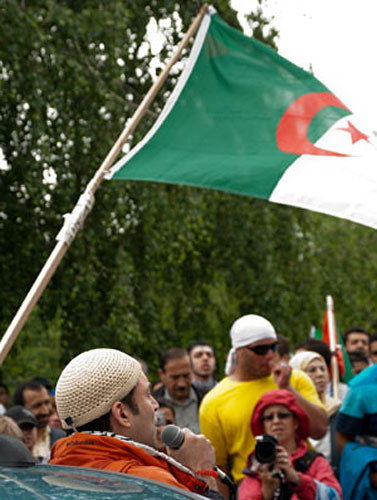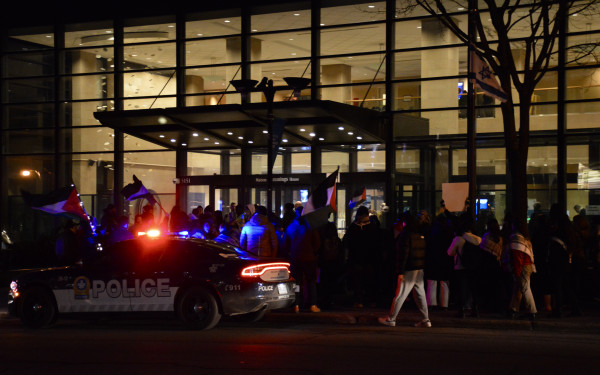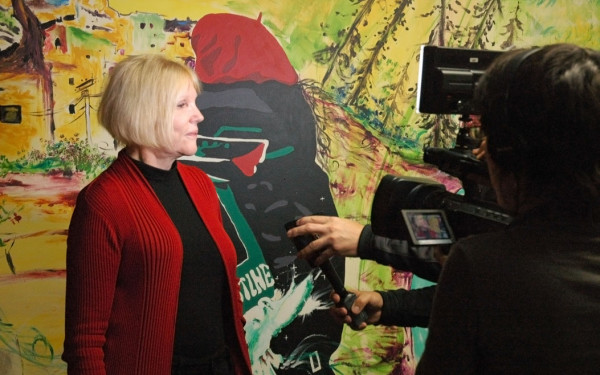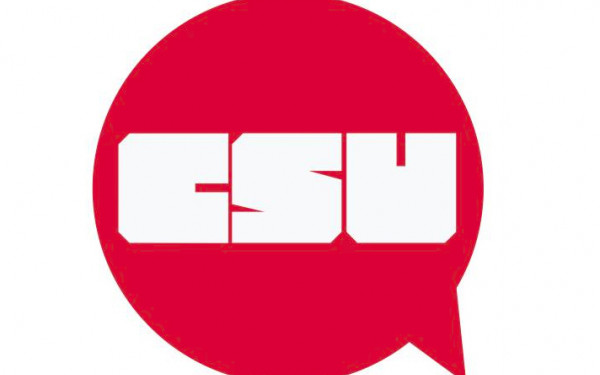Montrealers unite against Israeli flotilla attack
Protesters across Canada call for end to Gaza blockade
Hundreds of Montrealers marched through the city’s rainy streets on June 5 to protest the Israeli Navy’s lethal attack on a Gaza-bound aid ship a week earlier.
“We are going to launch a bigger flotilla in the next few weeks,” said protest organizer Laith Marouf, addressing the crowd on Sainte-Catherine Street through a megaphone. “[We’ll launch] 50, 60, 100 ships. We’ll break the siege of Gaza.”
On May 31, while still in international waters, the Israeli Navy intercepted and boarded a ship carrying aid supplies and about 700 pro-Palestinian activists from various countries, including Canada, to the Gaza strip.
After clashing with the activists, Israeli naval commandos opened fire on the civilian group, killing at least nine. The navy was enforcing a blockade of Gaza, which has been in effect since 2007.
Marouf began his address to the crowd by announcing that the Israeli government had intercepted the Rachel Corrie—another aid ship bound for Gaza—just hours before the protest.
“The Israeli occupation says that this blockade is justified by security reasons,” said Chadi Marouf of Palestinian and Jewish Unity Montreal. “I’ll tell you what security is. The Israeli government has a list of items forbidden from entering Gaza. Let me read from this list: sage, cumin, cilantro, coriander, jam, vinegar, nut meg, food preservatives, seeds and nuts, potato chips, cement, iron, glucose and the list goes on. How does cilantro and cumin have anything to do with security? [The Israeli government] is trying to break the will of the people.”
Protesters chanted and waved placards as they made their way from the corner of Ste-Catherine Street and Peel Street to Montreal’s Old Port, where the multi-ethnic crowd heard speeches from local activists, artists and trade union representatives. The march coincided with protests in Quebec City, Toronto, Ottawa, Calgary, Winnipeg, Vancouver and Victoria.
“The Israeli government has a list of items forbidden from entering Gaza. Let me read from this list: sage, cumin, cilantro, coriander, jam, vinegar, nut meg, food preservatives, seeds and nuts, potato chips, cement, iron, glucose and the list goes on. How does cilantro and cumin have anything to do with security?”
“It’s an issue that touches everybody,” said Marouf. “It’s not about Palestine versus Israel, it’s about what’s right and what’s wrong. What Israel is doing to the Palestinians is not strictly a punishment against [Palestine’s governing party] Hamas. Women and children are being starved and forced to live in deplorable conditions.”
Speaking on behalf of members of La confédération des syndicats nationaux—a confederation of trade union with over 200,000 members in Quebec—Gaetan Chateauneuf expressed his outrage at the blockade.
“The blockade must be lifted,” said Chateauneuf. “We should be incensed that our government supports a country that isolates and oppresses the Palestinian people.”
The 54,000 members of the Canadian Union of Postal Workers also threw their support behind the June 5 protests.
Speakers then called for a boycott of Israeli products, economic sanctions against Israel and the safe return of those detained on the aid ship—including Concordia graduate Abbas Al Lawatti, who was on the flotilla blogging for Gulf News, a Dubai-based English daily.
“[Al Lawatti] was detained because like the majority of the activists on the ship, he refused to sign a letter of confession for illegally entering Israel,” said Marouf, a friend of Al Lawatti’s.
Although Marouf was enraged by Israel’s actions he said he saw Saturday’s protest as a turning point for public support of the Palestinian people.
“A day like today really gives you hope.”
This article originally appeared in Volume 31, Issue 1, published June 11, 2010.







_600_375_90_s_c1.jpg)